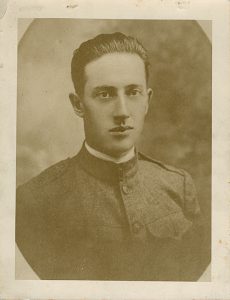 At 5 a.m. on the morning of November 11, 1918, the Armistice, which ceased hostilities during World War I as a prelude to peace negotiations, was signed. In the trenches on the often quoted ‘eleventh hour of the eleventh day of the eleventh month’ was Private Homer E. Simpson, a soldier from Covington, Virginia, who kept a diary of his service during the Great War. The diary begins with his registration for selective conscription on June 7, 1917 and ends with his honorable discharge on June 26, 1919.
At 5 a.m. on the morning of November 11, 1918, the Armistice, which ceased hostilities during World War I as a prelude to peace negotiations, was signed. In the trenches on the often quoted ‘eleventh hour of the eleventh day of the eleventh month’ was Private Homer E. Simpson, a soldier from Covington, Virginia, who kept a diary of his service during the Great War. The diary begins with his registration for selective conscription on June 7, 1917 and ends with his honorable discharge on June 26, 1919.
In his diary entry on November 11, 1918 he wrote:
At 10:30 Major Willis came by and said, “Boys keep your heads down; it will all be over in half of an hour.” The major had a smile on his face… We thought that he had probably lost his mind… At 11:00 sharp all firing ceased. We were bewildered… Every now and then someone would say, “There must be something to it.’”
The following day, in the most poignant entry in his diary, Simpson wrote:
Two days ago we were [a] hardened mechanical group…. not thinking that life was worth living. Nothing mattered except a horror of lying wounded on the battlefield. We gave no thought to the future… It was just a toss-up with me whether I got bumped off or lived through Hell.
His depression eased when he left the battlefield and once again slept in a bed, enjoyed good food, and had time to visit Paris and Versailles while awaiting his unit’s return home. That wait ended in June of 1919 when after “ten long days” at sea he recognized the coast of Virginia and debarked in Newport News — he had returned to “God’s country.”
 In his final entry on June 26, 1918, Private Simpson wrote, “I received my honorable discharge. I am glad that it shows nothing beyond the fact that I have been just an average private in a great group of American citizens.”
In his final entry on June 26, 1918, Private Simpson wrote, “I received my honorable discharge. I am glad that it shows nothing beyond the fact that I have been just an average private in a great group of American citizens.”
The complete transcript of Private Simpson’s diary is featured on the Marshall Foundation’s exhibit, 1918 – Over There and Back: The Diary of Homer E. Simpson as Kept During the Great War, on the Google Cultural Institute.
